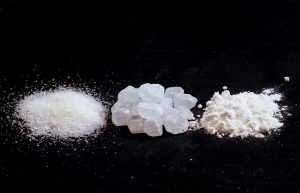PCP (phencyclidine), commonly called “angel dust,” is a powerful dissociative anesthetic that distorts perceptions and creates hallucinations. Originally developed as a surgical anesthetic in the 1950s, it was discontinued for medical use due to its severe psychological side effects.
Today, PCP is an illegal street drug known for causing:
✔ Extreme aggression
✔ Numbness to pain
✔ Psychotic episodes
✔ Violent behavior
Key Facts About PCP

- Street Names: Angel dust, rocket fuel, embalming fluid, supergrass
- Forms: White powder, liquid, pills, or soaked into cigarettes (“dipped”)
- How It’s Used: Smoked, snorted, swallowed, or injected
- Effects: Hallucinations, dissociation, superhuman strength, paranoia
- Duration: 4–6 hours (but psychosis can last days)
How Does PCP Affect the Brain?
It works by blocking NMDA receptors in the brain, disrupting:
- Pain perception
- Memory formation
- Emotional regulation
This leads to:
✔ Dissociation (feeling detached from reality)
✔ Hallucinations (seeing/hearing things that aren’t there)
✔ Aggression & reckless behavior
✔ Numbness to pain (users can injure themselves without realizing it)
Unlike ketamine (a similar dissociative), PCP is far more likely to cause violent outbursts and long-term psychosis.
Short-Term Effects of PCP
Physical Effects
- Numbness (can’t feel injuries)
- Increased heart rate & blood pressure (risk of stroke)
- Slurred speech & loss of coordination
- Seizures (at high doses)
Psychological Effects
- Euphoria or extreme panic
- Paranoia & delusions
- Aggression & violent behavior
- “Superhuman strength” (due to adrenaline surges)
The “PCP Zombie” Effect
High doses can cause:
✔ Blank staring
✔ Slow, robotic movements
✔ Complete detachment from reality
Long-Term Effects of PCP Use
1. Brain Damage
- Memory loss
- Speech difficulties
- Impaired judgment
2. Mental Health Disorders
- Schizophrenia-like psychosis
- Chronic depression & anxiety
- Flashbacks (even after quitting)
3. Physical Health Risks
- Kidney & liver damage
- Muscle breakdown (rhabdomyolysis)
- Weight loss & malnutrition
Is PCP Addictive?
Signs of PCP Addiction
✔ Cravings for the drug
✔ Using despite negative consequences
✔ Failed attempts to quit
✔ Withdrawal symptoms (depression, fatigue)
Can You Overdose on PCP?
- Yes, but deaths are usually from accidents or violent behavior rather than toxicity.
- Symptoms of overdose:
- Seizures
- Coma
- Extreme aggression
- Respiratory failure
PCP vs. Other Dissociative Drugs

| Drug | Primary Effect | Duration | Addiction Risk |
|---|---|---|---|
| PCP | Aggression, numbness, psychosis | 4–6 hours | High |
| Ketamine | Euphoria, dissociation | 30–90 mins | Moderate |
| DXM (Cough Syrup) | Dizziness, hallucinations | 4–6 hours | Moderate |
Key Difference:
- PCP is more dangerous due to violent tendencies.
- Ketamine is shorter-acting and used medically.
Frequently Asked Questions (FAQs)
1. Why Is PCP Called “Angel Dust”?
- The name comes from its powder form and the “out-of-body” experiences it causes.
2. Does it Really Make People Violent?
- Yes. PCP suppresses fear and pain, leading to reckless, aggressive behavior.
3. How Long Does it Stay in Your System?
- Blood: 24–48 hours
- Urine: Up to 8 days (chronic users)
- Hair: 90 days or more
4. Can it Cause Permanent Mental Illness?
- Yes. Long-term use can trigger chronic psychosis similar to schizophrenia.
5. Is’t Still Used as a Drug Today?
- Yes, but less common than in the 1970s–80s.
- Sometimes mixed with other drugs (like marijuana) without the user knowing.
How to Get Help for PCP Addiction
1. Medical Detox
- Supervised withdrawal to manage depression & cravings.
2. Inpatient Rehab
- 30–90 days of intensive therapy.
- Focus on behavioral counseling.
3. Support Groups
- 12-step programs (Narcotics Anonymous).
4. Medications
- Antidepressants may help with mood stabilization.
Final Thoughts: One of the Most Dangerous Drugs
PCP is unpredictable and highly dangerous, with risks including:
⚠ Violent behavior
⚠ Permanent psychosis
⚠ Life-threatening accidents
Key Takeaways:
❌ Never experiment with PCP—even one use can be catastrophic.
✅ Recovery is possible with professional treatment.
🚨 If someone is on PCP, call for help—they may be a danger to themselves/others.

“Yo @TheDriedMushroom, just out here pondering the cosmic mysteries… ever dabble in the angel dust archives, or is your stash strictly fungal folklore? 🍄✨ Either way, keep the vibes interstellar. 🚀”
Your writing feels like it’s opening a window into a world I didn’t know I needed to see.
Агрегатор.топ – единый агрегатор для контрактов, финансов и страхования.
Агрегатор контрактов – подряды, товары и услуги в одном месте.
Агрегатор финансов – банковские гарантии, лизинг, страхование от 80+ банков и 20+ лизинговых и страховых компаний.
Одна заявка – множество предложений. Экономьте время и деньги.
Сайт
https://aggregator.top